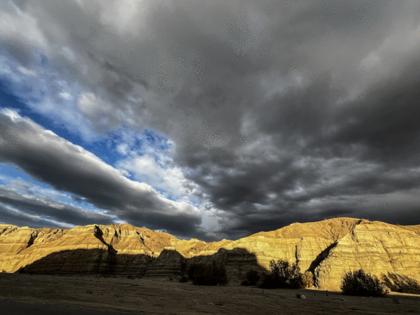Justice Department says Trump can undo monument designations
Published in News & Features
WASHINGTON — The president has broad legal authority to fully revoke national monument designations, the Justice Department says in a memorandum that could become the basis to withdraw millions of acres from protected status.
The department’s Office of Legal Counsel disavowed a 1938 DOJ determination that presidents can’t revoke a monument designation by a predecessor under the 1906 law known as the Antiquities Act. The May 27 memo, made public last week, noted that Congress gave presidents the power to declare monuments, but that lawmakers never explicitly said he couldn’t decrease the size of one.
President Donald Trump could use the opinion to go farther than he did in his first term, when he reduced the size of the Bears Ears and Grand Staircase-Escalante national monuments in Utah, and allowed commercial fishing in the Northeast Canyons and Seamounts Marine National Monument off the coast of New England.
The Biden administration later restored the two Utah monuments to their original size and restored the original protections for the Northeast Canyons and Seamounts monument.
The Justice Department said that if the president has the power to remove protections for a portion of a monument, then he could do so for the entirety of the monument.
“Or, put differently, if the President can declare that his predecessor was wrong regarding the value of preserving one such object on a given parcel, there is nothing preventing him from declaring that his predecessor was wrong about all such objects on a given parcel,” the opinion said.
Trump, during his first term, criticized former President Barack Obama’s decision to create the Utah monuments, referring to them as a “massive land grab.”
Interior Secretary Doug Burgum signed a secretarial order in February requiring the department to “review and, as appropriate, revise all withdrawn public lands.” Environmental groups criticized his order as setting the stage for the targeting of national monuments.
Burgum was on Capitol Hill for the two days following the release of the Justice Department opinion, testifying before the Senate Energy and Natural Resources and House Natural Resources committees on the department’s proposed fiscal 2026 budget.
Senate Energy and Natural Resources Chairman Mike Lee, R-Utah, praised the DOJ opinion, saying it “affirms what many of us have long argued, that the president has legal authority to consider monument designations that are overbroad, duplicative or disconnected from the statute’s stated purpose.”
“With this new legal clarity, we hope the Department of the Interior will work with us to ensure that public lands are managed in a way that reflects the needs of those who live closest to them,” said Lee.
Burgum, in response to Sen. Alex Padilla, D-Calif., said the department is ensuring the public was adequately engaged in the creation of monuments during previous administrations. Padilla said he expected the same level of engagement if there was any move to shrink or eliminate monuments in his state.
In the House, Burgum told House Natural Resources member Mike Kennedy, R-Utah, that he objected to the idea that “we can just transform and change the land use on millions of acres.”
“If you look at when these monuments were created, if people don’t think it’s political, the vast majority of them were created in the last weeks of administrations starting in the late 1990s,” said Burgum. “That’s when this whole trend began of this sort of broad interpretation of (the Antiquities Act).”
President Joe Biden used the Antiquities Act to designate some national monuments that had previously been the subject of Democratic legislation that had stalled in Congress.
In 2023 he designated the Baaj Nwaavjo I’tah Kukveni – Ancestral Footprints of the Grand Canyon National Monument after legislation to increase protections for this land passed the Democratic-controlled House in both 2019 and 2021, but was never taken up by the Senate.
Two national monuments in California designated during Biden’s final month in office were specifically named in the Justice Department’s opinion: the Sáttítla Highlands National Monument and the Chuckwalla National Monument.
Some Republicans, including Rep. Doug LaMalfa, R-Calif., have expressed concerns about the creation of these monuments using the Antiquities Act, saying it would put limitations on land that was already federally controlled.
_____
©2025 CQ-Roll Call, Inc., All Rights Reserved. Visit cqrollcall.com. Distributed by Tribune Content Agency, LLC.







Comments